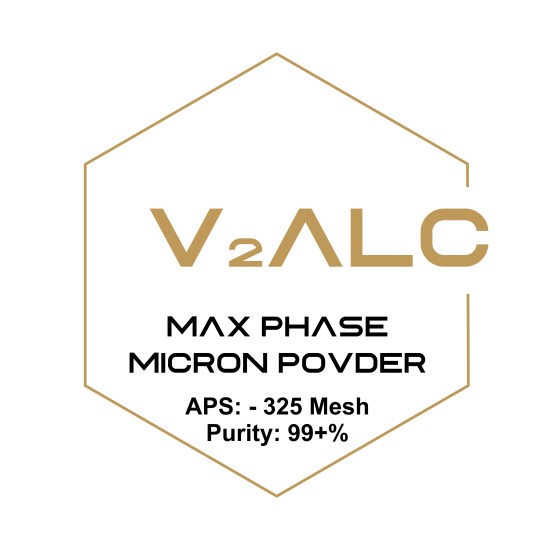
- Stock: In Stock
- Brand: Nanographenex
- SKU: GX01MPP0105
Available Options
Vanadium Aluminum Carbide (V2AlC) MAX Phase Micron Powder, APS: -325 Mesh, Purity: 99+%
PRODUCT PROPERTIES
Compound Formula | V2AlC |
Molecular Weight | 140.87 |
Appearance | Dark gray to black powder |
Melting Point | 2000 °C |
Boiling Point | N/A |
Density | 4.85 g/cm3 |
Certificate of Analysis (%)
Al | C | V | Other impurity allowance (%) |
19.0 | 8.5 | 72.12 | 0.3 |
Name: V2AlC MAX material
Product performance: high purity and excellent electrochemical performance
Purity: 99%
Storage condition: dry at room temperature
Process: HF treatment or HCl+LiF treatment
Details: Organ-like material, etched by hydrofluoric acid.
Applications: energy storage, catalysis, analytical chemistry, mechanics, adsorption, biology, microelectronics, sensors, etc
Product introduction
MAX phase ceramics (including titanium silicon carbide, Ti3AlC2 materials, etc.) are a new type of processing conductive ceramic materials that have attracted much attention. These ceramics contain more than sixty kinds of ternary carbides or nitrides. M represents the transitional front metal elements. ; A represents the main group element, mainly the elements of the third main group and the fourth main group; X represents a carbon or nitrogen element. Among them, Ti3SiC2 is the most widely studied. Ti3SiC2 was successfully synthesized by hot pressing method in 1996 by Professor Barsoum M of Drexel University in the United States, and its excellent performance was found. Due to the unique nano-layered crystal structure, these ceramic materials have antioxidant, self-lubricating properties, high room temperature fracture toughness and electrical conductivity. Such materials can be widely used as high temperature structural materials, electrode brush materials, chemical anticorrosive materials and high temperature heating elements. The products are mainly used for high temperature coating, MXene precursor, conductive self-lubricating ceramic, lithium ion battery, super capacitor, electrochemical catalysis.
Application Fields
MAX have been widely used in nano-adsorption, biosensors, ion sieving, catalysis, lithium-ion batteries, supercapacitors, lubrication and many other fields




